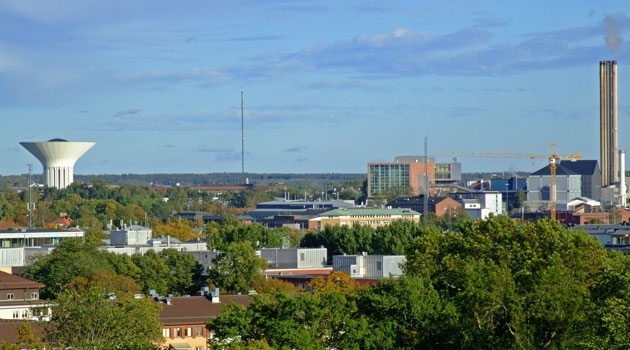Smart electricity grids needed for expanding city
Uppsala Municipality is growing, and the city plans to keep expanding rapidly between now and 2050. One challenge is to supply electricity sustainably. Jointly with Uppsala University, the municipality has appointed a PhD student to do the requisite research.
“The doctoral student will look at the options available, in terms of the energy system, for a city set to expand. The objective is to achieve an energy system in Uppsala that’s sustainable – environmentally, economically and socially,” Rafael Waters says.
Waters, a professor and docent at the Department of Electrical Engineering, is among the supervisors of the PhD student who started in May.
Electrical Engineering. Photo: Mikael Wallerstedt
Today, the power lines leading into Uppsala are already under-dimensioned, and this has led to the electricity supply being inadequate in the chilly winter months. At the same time, the city’s massive growth is set to continue. The “Uppsala Package”, one of Sweden’s largest current infrastructure projects, includes a four-track railway line to Stockholm and expansion of the south-eastern part of the city, with 33,000 new homes.
“It’s an extremely challenging situation already, so from the municipality’s point of view you can see a need to work out how we can keep developing the city without being limited by the electricity grid. There’s a tremendous lot to look at in terms of smart grids, renewable energy generation, and when and where to charge electric vehicles. How can we use the electricity grid more efficiently, so that we don’t need to develop new areas so often and so much?”
Mutual interest in cooperation
The doctoral student’s working time will be divided equally between the University and the municipality. The Foundation for Collaboration between the Universities in Uppsala, Business, and the Public Sector (STUNS in Swedish) will provide interfaces with various research environments, the municipality and the business community, thereby connecting these different stakeholder interests.
“When it comes to sustainable development of the community and the urban environment, it’s the municipality that has the needs and an interest in catching up with cutting-edge research, methods and ways of working. The University, for its part, gets guaranteed social relevance for the research. So the interest in development is mutual.”
In Waters’ view, the essential need is to find the right direction for the project, where high-quality research and relevance to society overlap.
“When both sides are committed and learning from each other, it simultaneously creates the opportunity to gear up and embark on more joint ventures. The hope is that finding overlaps like this will capture people’s attention in other research fields as well.”
People a huge part of the solution
In June 2019, the municipality and the University reached an agreement to work together for sustainable urban development, and this is a part of that collaboration. The Institute for Housing Research (IBF, part of the University’s Faculty of Social Sciences), too, has two researchers co-funded by the University and the municipality. In planning for future sustainable cities, developing smart technological solutions is not enough, in Waters’ opinion.
“Now that getting away from fossil fuels is on the agenda, electrification and smart energy systems are a major part of the solution. We’re going from being able to control electricity production, and adapt it to how we consume, to controlling the consumption instead. So one challenge with the energy system of the future is to make people a bigger part of the solution, and that’s why we need to work together across subject boundaries.”
Annica Hulth

